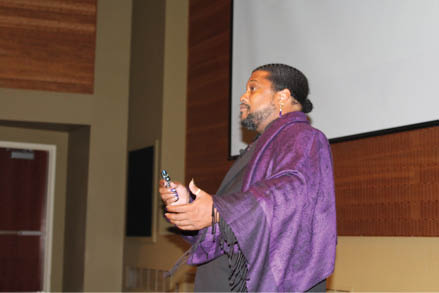Tyrone B. Hayes, Ph.D, who is known for his work on the herbicide atrazine and how it demasculinized male frogs, spoke at Winthrop on Monday, Oct. 9th. Hayes studied at the University of California Berkeley and Harvard and is currently professor of Integrative Biology at Berkeley.
In his lecture, “From Silent Springs to Silent Night: A Tale of Toads and Men,” Hayes discussed environmental justice concerns resulting from the global amphibian declines increased by pesticide usage and how targeted exposure of racial and ethnic minorities to pesticides results in health care disparities.
Hayes a Columbia, South Carolina native, spent a lot of time outside of at his grandmother’s house where he found his love for biology and frogs.
“For as long as I can remember I’ve been in love with frogs,” Hayes said in his lecture.
Hayes was an avid reader of National Geographic magazine and dreamed of going to Africa, an aspiration that came true for him during graduate school when he began working on his Ph.D. on the coast of Kenya.
“I got to go do work in Kenya, I got to grow this weird beard, and not only did I go to Africa, but National Geographic paid for it,” Hayes said. “I got to be on the show, I got to be in the magazine, I literally became that guy that I dreamed about when I was a little kid. My childhood dream, in the truest sense of the word, came true.”
In Kenya, he discovered a frog species with noticeable differences in appearance and color by gender, an uncommon feature among frogs. By dipping the frogs into various solutions, he and other researchers found that this was due to exposure to the hormone estrogen. Every type of estrogen that caused the frog to change color was also known to promote breast cancer, providing a means to screen pharmaceuticals used to treat breast cancer and chemicals that may stimulate it.
Hayes published a paper in the academic journal, Proceedings of the National Academy of Sciences of the United States of America, which detailed his findings about atrazine effects on hermaphroditic frogs. After exposure to the herbicide at low ecologically relevant doses, the frogs were demasculinized and feminized as a result. He and his research partners proposed that atrazine turned on aromatase, an enzyme that converts testosterone into estrogen. He also found that atrazine exposure reduces male fertility.
Another article co-authored by Hayes and published in PNAS, “Atrazine induces complete feminization and chemical castration in male African clawed frogs,” suggests how exposure to endocrine disruptors could lead to population effects in the wild and contribute to amphibian declines.
“Seventy percent of the world’s amphibians are in decline,” Hayes said. “A group of animals that survived the mass extinction that took out the dinosaurs, we are now losing in our lifetime probably because of things we’ve done.”
Atrazine exposure is also linked to breast cancer, according to Hayes. Breast cancer expresses aromatase, creating more estrogen which causes cells to grow and divide. Letrozole is a treatment for breast cancer that knocks out aromatase.
“How much sense does that make when the number one contaminant of drinking water does the opposite? It turns on aromatase, increases estrogen, and is associated with breast cancer in rats and humans,” Hayes said.
Some students were surprised by this information, including Winthrop senior Kaelyn Johnson. “I thought it was really interesting. It’s scary to know that all of that stuff is in our drinking water and no one really knows about it,” Johnson said.
Hayes addressed the environmental justice concerns of uneven exposure to chemical contaminants among low-income and minority groups. Pregnancy during high levels of atrazine increase the risk of birth defects including fetal gastroschisis, hypospadias and micropenis.
“We have to stop using adult white male to figure out what chemicals are safe and not safe,” Hayes said. “Because we know something that’s not harmful to an adult white male could have an incredible impact on a developing fetus.”
Hayes recommended students address these issues by writing to congress and finding constructive ways to get the information out to the public.
“You, as somebody who is privileged, and I’m speaking of your educational access that you guys have here, should try to [communicate] in a responsible way for others who aren’t lucky enough be here in this ivory tower like you are,” he said.




